Article 92: Coffee shops and the formation of social institutions
Not only a place to enjoy coffee, coffee shops are also an important social space to form institutions that contribute to the development of nations.
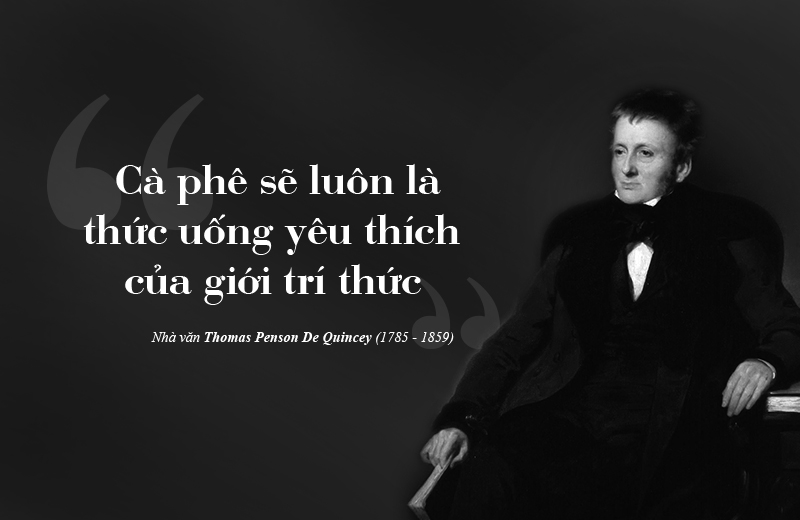
“Coffee will always be the favorite drink of intellectuals” – Writer Thomas Penson De Quincey (1785-1859)
Social connection space
Since the 18th century, the economic, political and social life of Europe has faced great changes due to the impact of the industrial revolution. Capitalism creates huge industrial cities, causing large waves of population displacement, accompanied by class conflicts, ethnic conflicts and increasingly diverse and complex social relations. The political revolutions since the mid-18th century profoundly changed the political institutions, social order and social institutions of Europe, as well as affecting the whole world. In the late 18th to 19th centuries, a commercial and technological revolution broke out to shake the old economic order. The feudal socio-economic form quickly collapsed before the expansion of the capitalist economic system, completely changing the socio-economic conditions of classes and social groups. In that context, the relationship between people in society was profoundly transformed. Along with the spirit of exalting knowledge, creativity, progressive ideas on individual freedom and national spirit, as well as the aspiration to rediscover human nature and the role of people in the society to reach a better life… becoming new practical needs for social awareness.
It is during these transitional periods that coffee shops, with the characteristic of being a place where all social classes from different ethnicities, groups, and professions can meet, chat, discuss, trade, etc. become an important social space of countries with typical coffee-enriching culture, such as: France, England, Italy, Austria, the United States… The coffee shop was not only a place to enjoy coffee but also functioned as cultural spaces, academic spaces, community spaces for social connection. From ordinary people in society, to philosophers, writers, artists, aristocrats, politicians, merchants, explorers… all converge at the cafe. A miniature society to talk, freely share personal views, and debate equally in the coffee shop has brought many thought flows from micro to macro, stimulating the creativity of innovators, and from then on, great thinkers met, became brothers and sisters, pursuing great goals together.
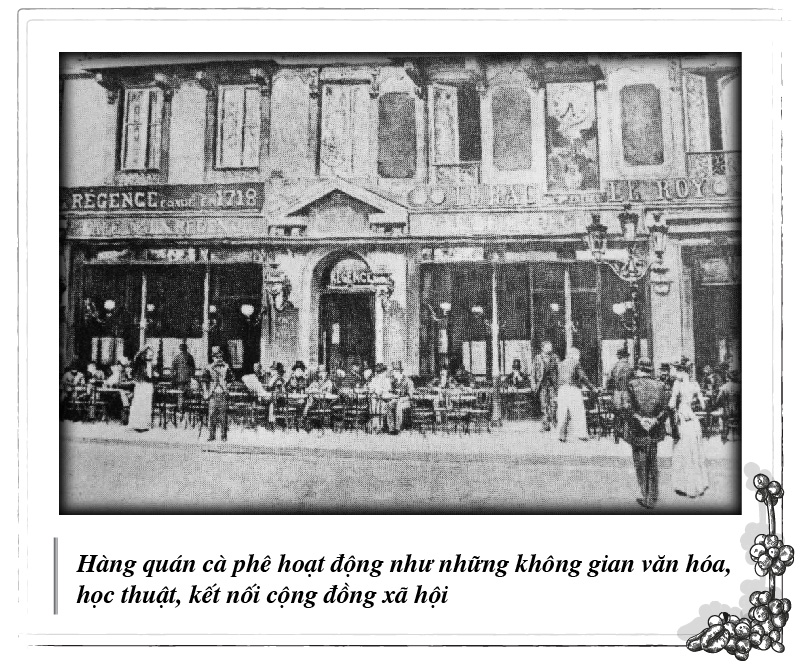
Coffee shops functioned as cultural spaces, academic spaces, community spaces for social connection.
In France, the legendary Café Procope space was the convergence of the elite intellectuals such as Diderot, Rousseau, Voltaire… The De la Régence restaurant was the favorite debate place of the Robespierre (one of the leaders of the French Revolution in 1789), Napoleon Bonaparte (French Emperor), Benjamin Franklin (founder of America), Karl Marx (founder of Scientific Socialism)… Meanwhile, the famous Gran Caffè Gambrinus space of Italy was the place to see all the intellectuals, politicians and artists including Salvatore Di Giacomo, Libero Bovio, Benedetto Croce, Eduardo De Filippo and Enrico De Nicola… who came to discuss cultural transitions, raising the aspiration for national unity.
In Vienna, Café Korb was famous for its weekly debates by thinkers like Sigmund Freud, Alfred Adler, Wilhelm Reich, Otto Rank, Karl Abraham, Carl Gustav Jung… Philosopher Ludwig Wittgenstein and a group of other thinkers Wiener Kreis intellectuals in the fields of philosophy, natural sciences, social sciences… chose Café Arkaden, Café Herrenhof, Café Reichsrat, Café Central as their rendezvous. After World War I, these spaces together with Café Griensteidl, Café Abbazia, Café Hawelka were the places where writers Hermann Broch, Robert Musil, Franz Werfel, Leo Perutz, Joseph Roth, Otto Soyka, Alfred Polgar… worked and created. In the UK, Will’s Coffee House was a meeting and discussion place for big names in literature such as: Jonathan Swift, Alexander Pope, Joseph Addison…
Meanwhile, coffee shops along the Mississippi River in New Orleans, USA such as Maspero Coffee House, Café du Monde, Café Au Lait, Royal Blend, CC’s Coffee House… were meeting places for traders. Coffee shops bearing American history such as Green Dragon, Union Oyster House, The Crown Coffee House, North-End (Boston), Merchants Coffee House, King’s Arms (New York), London Coffee House, Ye Coffee House (Philadelphia)… were the places where philosophers, revolutionary thinkers, freedom-loving people met to discuss justice and individual equality and encouraged building a civilized government with a guaranteed constitution of freedom for all citizens.
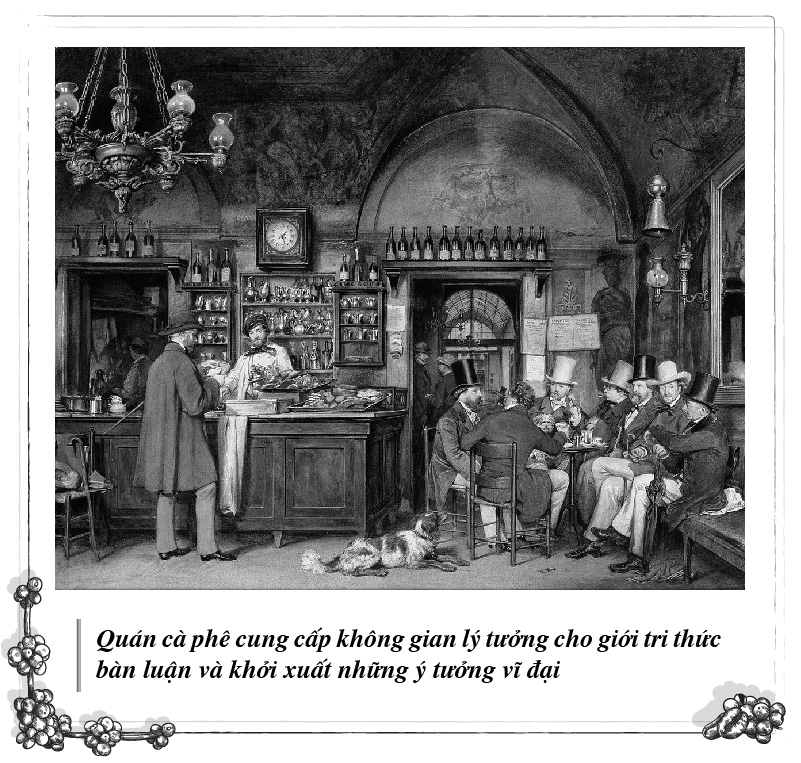
The coffee shop provides the ideal space for intellectuals to discuss and generate great ideas
Forming and developing social institutions
From the East to Europe and spreading around the world, coffee, and coffee shops act as a source of energy that catalyzes new ideas, a space for social connection, and promotes discussions, research on current issues, meet the needs of acquiring and spreading knowledge towards a better society. Considered as a part of urban cultural space in the development history of many countries, coffee shops have taken on many roles at the same time: schools, libraries, press distribution centers, theaters, political headquarters, literature – art clubs, business… contributing to the formation of important educational, cultural, political, and economic institutions.
In the 16th century, Istanbul first appeared coffee shop called “Mekteb-i ‘irfan” – a school that provided and disseminated new ideas in Ottoman society. Coming to Europe in the 17th century, coffee shops were praised as a Penny University in England, a sidewalk academy (Académie du Trottoir) in France and a Free University (Liberissima Università) in Italy. Not only welcoming everyone to debate, exchange information and work together, the cafe became an educational center, providing a variety of newspapers and magazines, as well as creating an academic environment in many fields with the participation of experts who initiated new cultural, ideological, and educational trends.
In Vienna’s Café Central there were always 250 newspapers available in 22 languages; in Italy, books, newspapers, and enlightening magazines such as “Il Caffè”, “Gazzetta Veneta”, “L’osservatore Veneto”, “Il Sognatore Iataliano”, “Giornale Veneto de ‘Letterati”, “La Minerva”, “La Frusta Letteraria” … were widely available in cafes. Important Italian literary magazines were also born from conversations in cafes, such as Caffè Giubbe Rosse, the birthplace of the magazines “Lacerba” and “Solaria”, or Caffè Florian associated with the magazine ” Gazzetta Veneta”. In England – the country that first started the Enlightenment movement, intellectuals jointly founded the magazines “The Tatler” (1709) and “The Spectator” (1711) which simulated conversations in coffee shops, expressing the desire to transform the way of life with virtue and wisdom. French intellectuals gathered at Café Procope to discuss writing “Encyclopédie” – an encyclopedia spreading human knowledge.
From that inspiration, in 1764, the great philosophers Pietro Verri, Alessandro Verri, Cesare Beccaria, Alfonso Longo, Pietro Secchi… belonging to a group of Italian enlightened intellectuals founded the magazine “Il Caffè” to build an intellectual foundation for the community through the ideas formed over a cup of coffee.
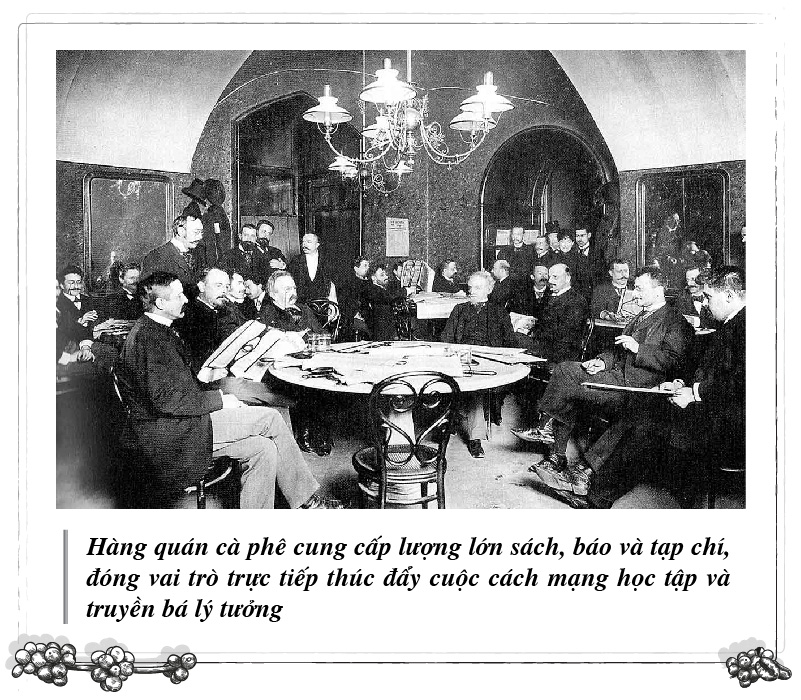
Coffee shops offered a wide range of books, newspapers, and magazines, which played a direct role in promoting the learning revolution and spreading the ideal.
Becoming a center of information and special education, coffee shops played a direct role in promoting the revolution of reading – learning and spreading ideals, forming important social science theories. Café Griensteidl is where the Jung-Wien (Young Vienna) literary group founded the research and development of modern literature, which exerted considerable influence on contemporary ideology. In the coffee club of Oxford University, Adam Smith created classics such as: The Theory of Moral Sentiments, The Wealth of Nations, theory of the capitalist economy… Café Landtmann is the place where Sigmund Freud researched and founded the theory of Psychoanalysis.
With the desire to recreate the world, the inspiration and ideas shared from coffee shops became a catalyst to nurture artistic and cultural movements. Café de Flore (France) is where Surrealism and the literary and artistic movement Dadaism developed. Coffee shops on State Street (Chicago) developed jazz, blues, rock music… In Italy, Caffè Michelangiolo is where Italian painters started the Macchiaioli art movement; or Caffè delle Giubbe Rosse is honored as the place where dreams and passions are forged, as well as where Futurism was born.
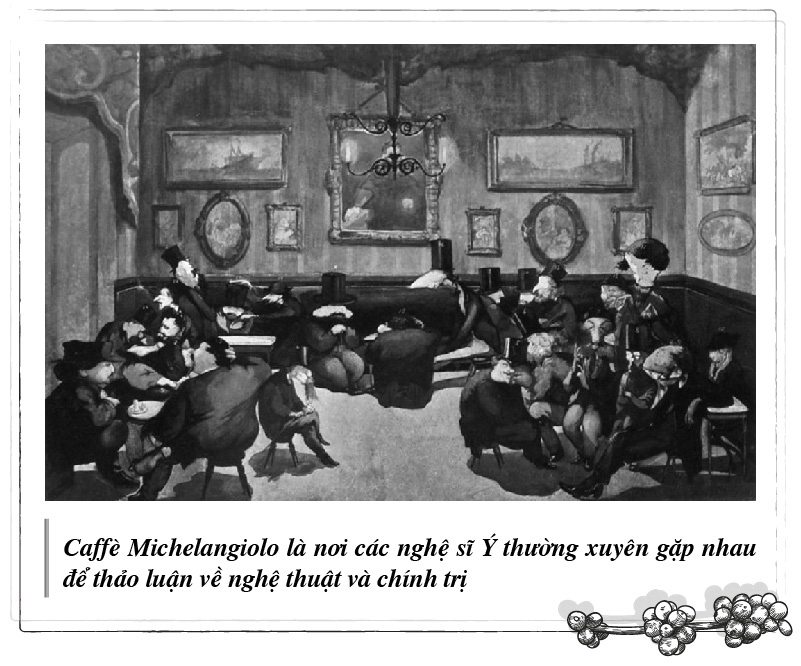
Caffe Michelangiolo is where Italian artists would meet to discuss art and politics
It was in the 18th – 19th centuries that coffee shops were also the places where people carrying the indomitable spirit of the times carried out the processes of political ideological renewal and revolutions to gain autonomy and freedom for the people. In the US, Green Dragon, Union Oyster House, The Crown Coffee House… are places where revolutionary thinkers discussed justice and individual equality and encouraged building a civilized government with a constitutionalized freedom for all citizens. Important political organizations such as the Freemasons, Sons of Liberty, Boston Caucus, Correspondence Committee networked at the Gree Cafe. Or the City Tavern Cafe is where the first Continental Congress held its meeting in 1774 to fight British oppression. Here Thomas Jefferson, along with John Adams, Benjamin Franklin, Roger Sherman, and Robert Livingson discussed continuously for several days to draft the Declaration of Independence with a message embodying the ideals of the United States.
Particularly for Italy, coffee shops played a very important role in the process of renewing political ideology and unifying the country. At the Gran Caffè Renzelli, Domenico Frugiuele and Gianfelice Petrassi promoted an uprising against the Bourbons Kingdom in 1844 and decided to declare a constitutional government. Caffè Pedrocchi was again an important meeting place for patriots during the uprising of Italian Unification. These days, in any Italian city-state, there are historical cafes. In Milan, the Caffè della Peppina, Caffè-Pasticceria Cova is home to the Italian Youth Association. In Naples, the Gran Caffè Gambrinus is the most popular meeting spot for Neapolitan intellectuals. Or Caffè dell’Infrascata was where young patriots shouted, “Live freedom” and “Long live Italy” before being persecuted in 1801.
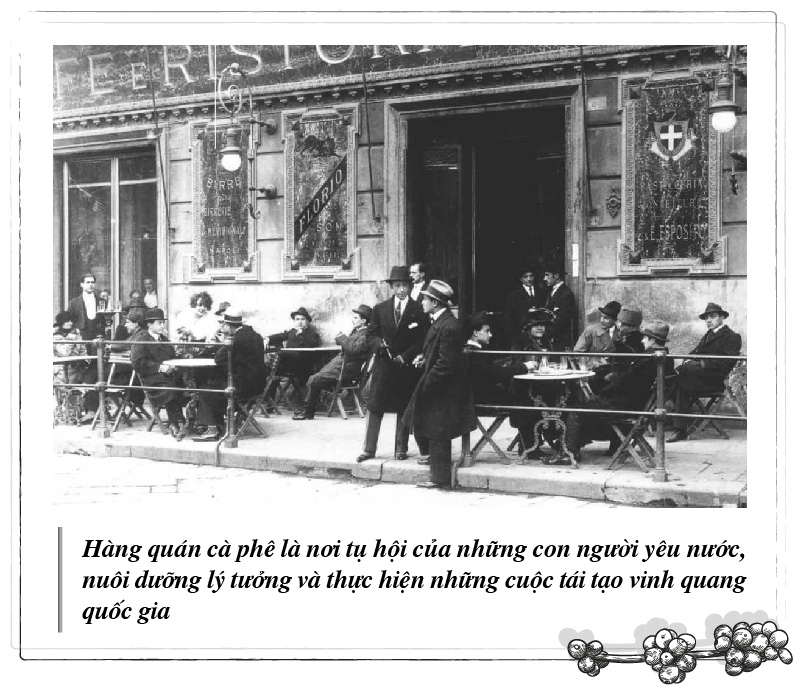
Coffee shops are the gathering place of patriots, nurturing ideals and carrying out re- creations of national glory.
Since the 17th century, coffee shops have played an important and diverse role in the development of a better society. Today, coffee shops are always an ideal social space, a bridge for intellectual development and creative sublimation. Coffee and coffee shops have been developing into a lifestyle, a life philosophy and a symbol of a civilized lifestyle.
Readers are cordially invited to watch the series of Coffee Tao videos posted on https://bit.ly/caphetrietdao
THE REAL COFFEE
ROASTED ONLY FOR PEOPLE OF WISDOM!
Source: “The Philosophical Way of Coffee” – copyright by Trung Nguyen Legend
Coming up: Coffee etiquette – Social practices in different countries


